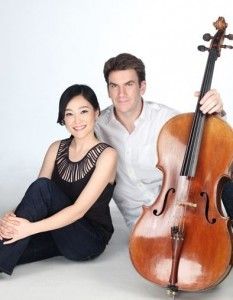|
Symphony
FROM THE NEW WORLD TO THE OLD WORLD
by Peter Lert
Saturday, June 14, 2025
Chamber
MC2 DUO RECITAL CLOSES 222'S SEASON
by Terry McNeill
Saturday, June 14, 2025
Choral and Vocal
CANTIAMO SONOMA'S LUSCIOUS A CAPELLA SINGING IN SEASON ENDING CONCERT
by Pamela Hicks Gailey
Sunday, June 8, 2025
Symphony
SRS SEASON ENDS WITH RESOUNDING TA-TA-TA-BANG
by Terry McNeill
Sunday, June 1, 2025
Symphony
YOUTHFUL VIRTUOSITY ON DISPLAY AT USO'S MAY CONCERTS
by Peter Lert
Saturday, May 17, 2025
Symphony
MYSTICAL PLANETS AND LIVELY GERSHWIN ORTIZ AT FINAL SRS CONCERT
by Peter Lert
Sunday, May 4, 2025
Symphony
VSO'S CONCERT MUSIC OF TIME, MUSIC OF PLACE
by Peter Lert
Sunday, April 27, 2025
VOCAL ELEGANCE AND FIRE AT THE 222'S RECITAL APRIL 26
by Pamela Hicks Gailey
Saturday, April 26, 2025
CANTIAMO SONOMA SINGS AN INSPIRED GOOD FRIDAY MOZART REQUIEM CONCERT
by Pamela Hicks Gailey
Friday, April 18, 2025
DRAMATIC SHOSTAKOVICH SYMPHONY CLOSES PHILHARMONIC'S 25TH SEASON
by Terry McNeill
Sunday, April 13, 2025
|
 |
 Jeewon Park and Edward Arron |
FAST BUT NOT ALWAYS FURIOUS IN OAKMONT CELLO RECITAL
by Terry McNeill
Thursday, January 12, 2017
New England-based cellist Edward Arron played an encore recital Jan. 12 at Music at Oakmont’s Berger Auditorium that was a in almost every way a success and surely an audience delight.
Beginning with Bach’s G Major Sonata gamba the cellist and pianist Jeewon Park played the work that rolls along without a great deal of contrast or even excitement. Here the string vibrato is minimal and Mr. Arron underscored long held notes prior to the two Allegro movements, and juxtaposing plaintive and quiet themes with the finale’s jaunty and etude-style parts. Though a workmanlike performance, this Sonata (unlike the epic Six Suites for Cello) passed without much notice.
Not so for the Barber C Minor Sonata, Op. 6, which closed the concert’s half. The cellist gave Barber’s youthful work a passionate performance with a big sound, swelling richly on notes and stating the sweet second theme with wide vibrato and compelling bottom end sonority. Playing in the Adagio was surprisingly fast with a Spiccato bow and a bantamweight ending.
The finale Allegro Appassionato was played with a broad sweep but was also a bit ruminating. Ms. Park’s pianism had ample articulation and balances with the cello were exemplary. The music exploits the entire range of the cello and Mr. Arron’s strong but when necessary delicate bow arm control conquered all.
Pärt’s strange but compelling Spiegel im Spiegel found Ms. Park playing repeated ascending triad notes over a pedal point cello and starkly held cello notes. This was a fascinating performance of a quasi-minimalist work, mostly in pianissimo with many one-step note progressions and soft triad chords and minimal vibrato. The many deceptive cadences and the piano line in the high treble (“dripping water sound”) and the pauses between cello phrases added up to a unique sonic and perhaps spiritual experience. At the end the sound faded to absolute zero!
Berger’s infamous noisy HVAC system impinged on Pärt’s super-subtle composition, but it was a cold day and the 160 people in the Hall were rightly mesmerized by the 1978 work originally written for violin and piano.
Concluding the concert was Mendelssohn’s D Major Sonata, Op. 58, arguably with the Beethoven A Major the most played classical cello sonata. In a turnabout the duo turned the epic first movement into hash by choosing a tempo the music, or at least their playing of it, could not support. The tempo was so fast that the expected big ritard at the piano’s insistent four repeated chords (at the point in the 78 era where the limited time recording stopped, as in the Feuerman version) was avoided, and Mr. Arron’s comprehensive technique was fully stretched.
Just as critical was Ms. Park’s inability at the chosen tempo to articulate scale passages, resulting is constant blurring and by playing on top of the keys missing the excitement that fast and clean pianism creates. Brilliance in music isn’t a matter of speed but of clarity.
Clarity returned in the Allegretto with fine Pizzicato technique and exceptionally subtle phrasing and controlled spontaneity, and the following Adagio’s flowing choral-like melody had rich string color.
The brilliant Molto Allegro movement was of course fast but had shape with section ritards and driving momentum, with Ms. Park an assertive partner.
A standing ovation generated the duo’s return to the stage and a unique question that Mr. Arron posed to his appreciative audience. He said, “Is there time for one more?” In a half-century of concert reviewing I have never heard an artist say anything like this, as usually encores are quickly identified or simply played without identification.
What came was a Mendelssohn’s D Major Song Without Words, Op. 109, in a luminous reading with chaste tone and perfectly sculpted phrasing. Praise for this encore performance could not be higher.
|
